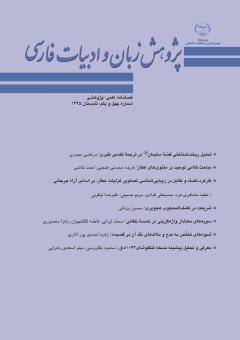شريعت در كشفالمحجوب هجويري
محورهای موضوعی : پژوهشهای ادبیات کلاسیک ایران
1 - استادیار گروه زبان و ادبیات فارسی، دانشگاه پیام نور
کلید واژه: كشفالمحجوب هجويري شريعت قرآن سنت,
چکیده مقاله :
با بررسی ادوار مختلف تاریخ تصوف، گاه به انحرافهایی برمیخوریم که اعتراض شدید بزرگان عارف را در پی داشته است؛ یکی از این انحرافات که تا روزگار ما نیز استمرار یافته، نظریۀ «اسقاط تکلیف» و «بطلان شریعت» است. «شريعت» از واژههاي كليدي تمام متون عرفاني و سنجه ای برای تشخیص راه درست از نادرست در وادی عرفان است. «كشفالمحجوب» از امهات کتب صوفیانۀ فارسی، که از آثار مهم و ارجمند قرن پنجم هجري و نزد پژوهشگران از نخستين منابع در خور توجه است، به اين مقوله توجه خاصی دارد و چون از دیرباز مرجع معتبر پژوهشگران در حوزۀ عرفان و تصوف بوده، برای این مطالعه انتخاب شده است. مقالۀ حاضر، گزارشی پژوهشی است که با روش توصیفی- تحلیلی مبتنی بر شواهدی از کتاب «كشفالمحجوب» هجویری حاصل شده است. در این كتاب، شریعت، تنها به مفهوم وظایف و تکالیف دینی و فقهی نیست؛ بلکه در معنایی وسیع تر، تمام معارف و آموزههای سلوکی را دربرمیگیرد. برخلاف تأویلهای انحرافی و «شریعتگریز» و بعضاً «شریعتستیز»، در هيچ مرحله اي از مراحل سلوك، شریعت، ساقط نمي شود؛ زیرا بين شريعت و حقيقت اختلافي وجود ندارد؛ منطق هجويري در پذيرفتن يا رد هر مسئلهاي، مطابقت امور با اركان شريعت است. او شريعت را محك و معياري براي تشخيص ولي، كرامت و ... و نیز مباني شريعت، قرآن، سنت و اجماع و همچنین عقل را مؤيّد شريعت میداند.
By studying different periods of the history of mysticism, one can find some deviations which caused the strong objection of some great mystics. One of these deviations which remained till the present time, is the theory of ‘escaping from the duties’ and ‘voidance of Shariah’. Shariah is one of the key words in all mystic texts and a gauge for identifying the right path from the wrong one in mysticism. Kashf- ol-Mahjub which is one of the important Persian mystic books and one of the important and valuable works of the fifth century (Hijri) which also considered to be among the first noteworthy sources according to scholars, has paid special attention to this topic. Therefore, it has been chosen for this study. In this article a descriptive- analytical research method based on some evidence from Hojviri’s Kashf-ol-Mahjub is used. According to this book, Shariah is not just some religious and jurisprudential duties, but in a broader sense it includes all the practical knowledge and teachings. On the contrary to distorted and ‘anti Shariah or irreligious interpretations, in none of the stages of spiritual journey you can escape from Shariah since there is no difference between Shariah and the absolute Truth. Hojviri’s reason in accepting or rejecting any issue is in concordance with principles of Shariah. According to Hojviri Shariah is a criteria for identifying the Leader, dignity, etc. Furthermore, he believes that the principles of Shariah, Quran, Sunnah and Ejma, and also wisdom confirm Shariah.
امينينژاد، علي (1387) آشنايي با مجموعه عرفان اسلامي، اول، قم، مؤسسه آموزشي وپژوهشي امام خميني.
برتلس، يوگني ادوارد ويچ (1382) تصوف و ادبيات تصوف، ترجمة سيروس ايزدي، سوم، تهران، اميركبير.
ترمذي، محمد بن علي (1422ه.ق) ختم الاوليا، مصحح عثمان اسماعيل يحيي بيروت مهد الاداب الشرقيه.
حافظ، شمس الدين محمد (1371) ديوان حافظ شيرازي، از نسخه دكتر قاسم غني و علامه قزويني، تهران، ساحل.
سراج طوسي، ابونصر (1381) اللمع في التصوف، تصحيح و تحشيه رينوند آلن نيكلسون، ترجمه دكتر مهدي محبتي، تهران، اساطير.
سليم، غلامرضا (1380) شريعت، طريقت، حقيقت، اول، تهران، روزنه.
سياح، احمد (1378) فرهنگ بزرگ جامع نوين (ترجمة المنجد)، چاپ دوم، تهران، اسلام.
طباطبايي، سيد محمد حسين (1374) تفسير الميزان، ترجمه سيدمحمد باقرموسوي همداني، قم، جامعه مدرسين.
طبرسی، ابومنصور احمد بن علی بن ابـی طـالب (1386ه.
ق) الاحـتجاج، تحقیق سید محمد باقر خرسان، نجف، دارالنعمان.
عابدی، محمود (1384) مقدمۀ کشف المحجوب هجویری، تهران، سروش.
قشيري، عبدالكريم بن هوازن (1381) رسالة قشيريه، تصحيحات و استدراكات، بديع الزمان فروزانفر، هفتم، تهران، علمي و فرهنگي.
قونوی، صدرالدین (1381) اعجازالبیان فی تفسیر ام القرآن، تصحیح سید جلال الدین آشتیانی، قم، بوستان کتاب.
گوهرين، سيد صادق (1386) شرح اصطلاحات صوفيه، تهران، زوار.
محدّث نوري، ميرزا حسين (1408هـ.
ق) مستدرک الوسائل، قم، مؤسّسة آلالبيت (ع(.
ج11.
محمدي ري¬شهري، محمد (1362) ميزان الحكمه، الطبعة الاولي، مركز النشر، مكتب الاعلام الاسلامي.
مستملي بخاري، ابوابراهيم اسماعيل¬بن محمد (1383) شرح التّعرف لمذهب التّصوف، ربع دوم، مقدمه و تصحيح و تحشيه محمد روش، چاپ دوم، تهران، اساطير.
مصطفوی، حسن (1360) التحقیق فی کلمات القرآن الکریم، تهران، بنگاه ترجمه و نشر کتاب.
مولوي، جلال الدين (1376) مثنوي معنوي، نيکلسون، تهران، ققنوس.
ميبدي، رشيدالدين (1371) كشف الاسرار و عدﺓ الابرار، به سعي و اهتمام علي اصغر حكمت، جلد 2، چاپ پنجم، تهران، اميركبير.
هجويري، ابوالحسن علي بن عثمان (1384) كشفالمحجوب، مقدمه، تصحيح و تعليقات محمود عابدي، چاپ دوم، تهران، سروش.
يزدان پناه، سيد يدالله (1389) مباني واصول عرفان نظري اول، قم ، مؤسسه آموزشي و پژوهشي امام خميني.

